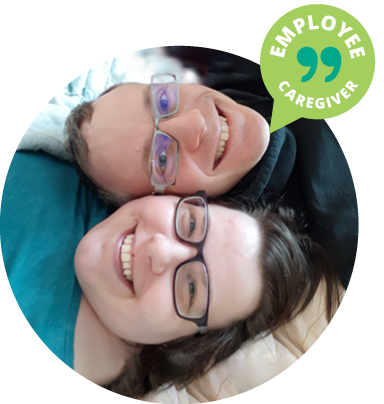Darren Hinger,
caregiver for his wife
Our caregiving journey doesn’t lend itself to a single narrative because there are so many ups and downs. Things can be going fine one day, and then take a turn for the worse the next. Things may feel as though they are moving forward, backward, standing still, or going in circles and often all at the same time.
I am a caregiver for my wife who has complex health challenges. When we met, she only needed casual support. Over time, her health got worse, and she was no longer able to work and needed help with daily living. She would be at home alone, struggling. And I would be at work, my mind torn between my professional tasks and my caregiving duties.
In some of the hardest times, I didn’t know what kind of support to ask for and my workplace didn’t know what to offer. It led to a lot of stress for myself, my coworkers, and my wife.
I have gotten much better at balancing these duties and communicating my needs. And my workplace is very understanding of my caregiving journey. It is still challenging, and sometimes feels like I am pulled in two directions. Despite my best efforts, I sometimes miss my wife’s appointments due to work obligations, and feel incredible guilt and regret.
Working together with my workplace we have found ways forward. For example, work from home policies help family caregivers and improve productivity at the same time. For everyone’s benefit, we need to normalize these types of accommodations for family caregivers.

“In some of the hardest times, I didn’t know what kind of support to ask for and my workplace didn’t know what to offer.”

“In some of the hardest times, I didn’t know what kind of support to ask for and my workplace didn’t know what to offer.”
Darren Hinger,
caregiver for his wife
Our caregiving journey doesn’t lend itself to a single narrative because there are so many ups and downs. Things can be going fine one day, and then take a turn for the worse the next. Things may feel as though they are moving forward, backward, standing still, or going in circles and often all at the same time.
I am a caregiver for my wife who has complex health challenges. When we met, she only needed casual support. Over time, her health got worse, and she was no longer able to work and needed help with daily living. She would be at home alone, struggling. And I would be at work, my mind torn between my professional tasks and my caregiving duties.
In some of the hardest times, I didn’t know what kind of support to ask for and my workplace didn’t know what to offer. It led to a lot of stress for myself, my coworkers, and my wife.
I have gotten much better at balancing these duties and communicating my needs. And my workplace is very understanding of my caregiving journey. It is still challenging, and sometimes feels like I am pulled in two directions. Despite my best efforts, I sometimes miss my wife’s appointments due to work obligations, and feel incredible guilt and regret.
Working together with my workplace we have found ways forward. For example, work from home policies help family caregivers and improve productivity at the same time. For everyone’s benefit, we need to normalize these types of accommodations for family caregivers.

